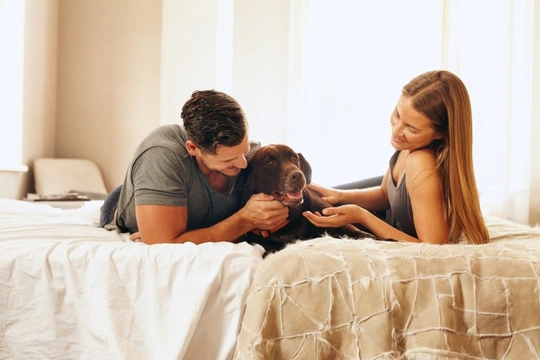
Is there anything you can do if your dog keeps waking you up in the early morning?
Having a set routine is important for dogs, because this helps to make them feel secure and lets them know what to expect at different times of the day. A dog that is used to being fed, walked, and put to bed at around the same times every day will be happier and generally easier to manage than a dog that doesn’t know when they will be fed, walked, or let out for the toilet, and this can help to reduce anxiety and behavioural problems in the dog too.
Additionally, by setting your dog’s routine and sticking to it, you can help to make life somewhat easier for yourself too because you can plan your dog’s timings around a schedule that suits you. This means that you can plan your dog’s final toilet break and bedtime to coincide with the time that you also settle down for the night, so that you can get an uninterrupted night’s sleep without worrying about the dog needing to go out or get up.
However, if your dog keeps waking you up earlier than you would like them to and this is not related to physical needs like toileting, this can be very disruptive for your own sleep schedule, and soon start to mess with your own routine too.
If your dog keeps waking you up early in the morning and you are wondering if there is anything you can do about it, this article is for you. Read on to find out how to stop your dog from waking you up before you are ready.
Meeting all of your dog’s needs
First of all, if your dog is waking you up too early, you need to consider if all of their needs are being met, or if something about your dog’s lifestyle or routine is interrupting their sleep or making them unable to sleep for a normal amount of time.
Perhaps the first thing to look at is if your dog needs the toilet; dogs that are housetrained will be very reluctant to toilet inside even if they are desperate, and a dog that needs the loo and can’t wait will tend to be very persistent about waking you up.
Look at whether your dog is being exercised enough and has a walk late enough to tire them out for bed, if their feeding routine matches their needs and if they get enough chances to toilet, particularly after their final meal of the day and before they settle down for the night.
Setting an appropriate routine
If your dog spends most of the evening relaxing on the sofa with you and napping, they might not sleep through the night as they will already have caught up on their rest earlier on. Your dog’s routine should be designed to meet both their needs and yours, so work out the routine to enable this, planning walks at times that support your dog’s lifestyle, feeding times and toilet breaks to coincide with times that suit you, and ensure that your dog is tired and looking forwards to rest at bedtime.
Not all dogs can settle down for a full night’s sleep
Old dogs and puppies both tend to sleep a lot more than young adult dogs, but their sleeping patterns might tend to be more erratic too. Many older dogs snooze a lot but may not be able to sleep through the night, and the same is true for pups.
Puppies and elderly dogs might also need to use the loo more than other dogs, and not all dogs (particularly very young and old ones) will be able to go through eight hours at night without toileting.
If your dog’s routine is a good fit but they need to use the loo during the night, this is unlikely to be something that you can change, and you should always ensure that your dog’s needs are met and that they can go out to the toilet when they need to.
Creating a restful sleeping spot for your dog
If your dog’s bed and sleeping spot isn’t comfortable and welcoming for them, they won’t sleep very well. Ensure that the temperature of the place that your dog sleeps in is warm enough at night, that their bed is comfortable, and that they find the area that they sleep in to be relaxing and comforting.
Learned behaviour and resolving it
Waking you up in the early morning can begin to become a regular behaviour for dogs if this happens for a reason but is then reinforced by the responses of their owners. Even if your dog needed the toilet the first time or had another valid reason to wake you up, once they have learnt that you will get up and interact with them if they wake you, they may keep doing so simply for the added attention.
If your dog’s routine is a good fit for them and your dog didn’t have a good reason to wake you up, their actions may be learned, and so you will need to train your dog out of doing this in future, which will generally mean closing the bedroom door and ignoring them even though this will probably mean you won’t get to sleep for the duration.
Reinforcing the behaviour by shouting at your dog or giving in will simply make it harder to deal with next time!



